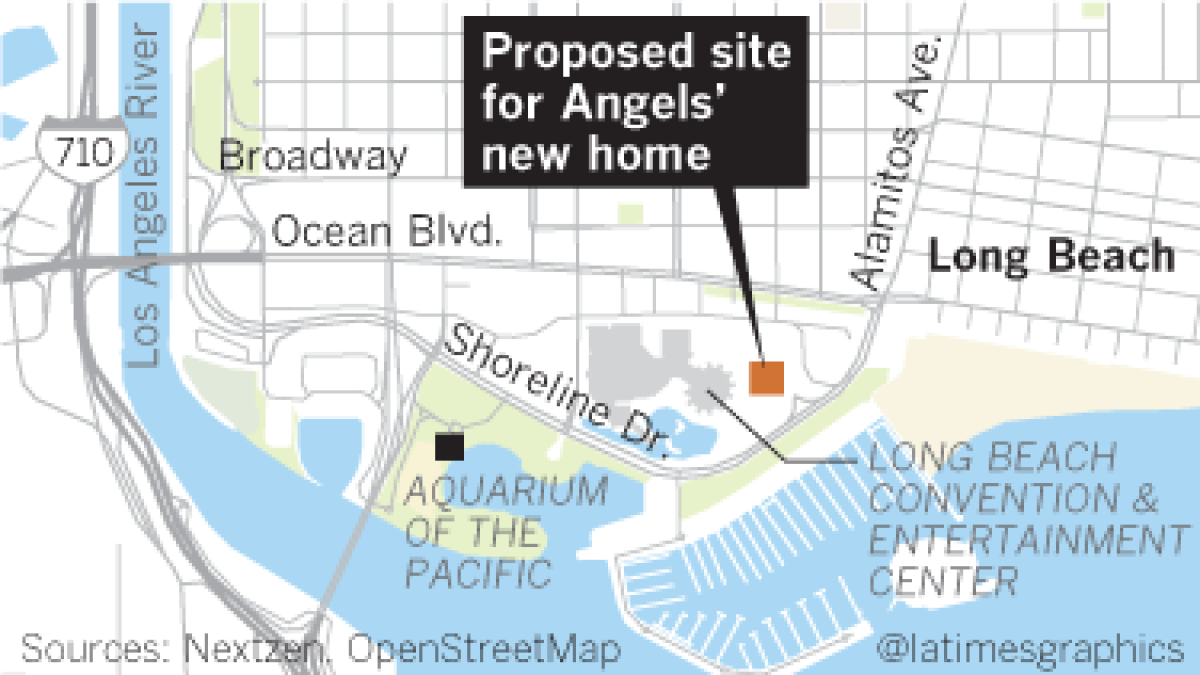Proposed Angels ballpark in Long Beach could cost more than $1 billion

L.A. Times Today airs Monday through Friday at 7 p.m. and 10 p.m. on Spectrum News 1.
- Share via
A waterfront ballpark to attract the Angels to Long Beach could cost more than $1.1 billion, and the city has received a study that explores options for paying some or all of that cost, according to city documents released Monday night.
The Angels have had discussions with Long Beach officials but have not committed to move, and the city has not committed to pay anything toward the construction of a stadium. The Angels have said they hope to decide between Anaheim and Long Beach by year’s end.
The report comes as California’s large coastal cities largely have rejected the idea of paying for professional sports facilities.
The Oakland Athletics, in pursuit of their own waterfront ballpark, have pledged to pay for it all by themselves, albeit with publicly financed infrastructure for the ballpark neighborhood. And, after San Diego voters rejected public funding for a new football stadium there, the Chargers moved to Los Angeles to join the Rams in a privately financed stadium in Inglewood scheduled to open in 2020.

Even if the Angels agreed to move to Long Beach this year, a new ballpark probably wouldn’t open there before the 2025 season, based on a projected timeline included in a city document. The city released more than 500 pages of records in response to public records requests filed by The Times and other news organizations.
The city last October estimated the cost of a stadium at $900 million, not including more than $200 million in financing costs, and an additional $105 million to put up a parking garage with 3,500 spaces. The city’s plan relies heavily on parking in existing structures within walking distance of the proposed ballpark, with consideration of shuttles from remote lots as far as seven miles away.
The menu of financing options presented to the city included several that would require voter approval, which could be challenging to secure. In 2016, Long Beach voters approved raising the sales tax to 10.25%. Only one city in California — Santa Fe Springs — has a higher tax rate. (The rate in Anaheim is 7.75%.)
The report also suggested the city could use revenues from naming rights, concessions and sponsorships. In most cases, that revenue belongs to the team. A likelier scenario: Tax generated from the ballpark and surrounding development would be diverted to help pay for the project, rather than made available for other city uses.
The records show that Long Beach reached out to the Angels in 2014, as the team held discussions with the city of Tustin about a possible move there, and met with the Angels in 2017. The team exercised its right to opt out of its Angel Stadium lease in 2018, then negotiated an extension with the city of Anaheim through the 2020 season.
Sign up for our daily sports newsletter » »
Long Beach sent an initial proposal to the Angels on March 22 and a revised proposal on May 3. The specifics of the proposals were not disclosed, beyond a general pitch for a waterfront development that would include a stadium, a “dynamic entertainment destination” and housing “for a diversity of current and future Long Beach residents.”
The city provided no record of an Angels response. As they evaluate opportunities in Long Beach, the Angels are preparing to start discussions with the city of Anaheim for a similar project: a stadium and surrounding development. The city of Anaheim is awaiting the results of an Angel Stadium land appraisal before negotiating with the Angels. The city of Long Beach has said it has not conducted an appraisal of the land under discussion with the Angels.
Long Beach estimated that at least three years, and perhaps up to three and a half years, would be needed for approvals from the city and the California Coastal Commission. Ballpark construction would follow those approvals.
The A’s, already active in their drive for a waterfront ballpark, project two years for construction and an opening in 2023.
The Angels’ lease with Anaheim expires after the 2020 season, so a Long Beach deal could require the team to negotiate a lame-duck extension to play at Angel Stadium. The NFL’s Raiders have negotiated a similar extension with the Oakland Coliseum, in advance of the team’s pending move to Las Vegas.
More to Read
Go beyond the scoreboard
Get the latest on L.A.'s teams in the daily Sports Report newsletter.
You may occasionally receive promotional content from the Los Angeles Times.







